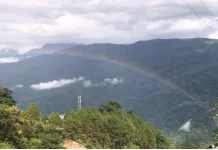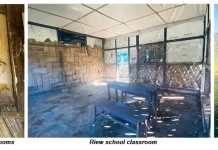2014
(24 December, 2014)
A chilling reminder
[ Tongam Rina ]
After the horrendous Daporijo Police Station MMS scandal that rocked the state in 2011, yet again, an explicit video clip has emerged from the same town, forcing people to come out on the street in protest. In 2009, the police officers forced a teenage boy and a girl to have sex in the station while they took the video. The video emerged almost two years later. The sheer atrocity and unimaginable act of the law keepers inside a police station shocked the state. Records say that the main accused in Police Station MMS case was never caught.
This time, the person behind the video clip is allegedly an ITBP personnel posted in remote Limeking circle. As the details are unfolding, the latest report says that the girl is underage. The personnel should have known better that it is a crime to indulge in such an act with a teenage girl who legitimately could not have given her consent. It remains to be seen what course law will take but in the meantime, the only way we can help is by stopping the circulation of the video.
For obvious reasons, crimes against women have increased in the state. Between Jan 2013-Dec 2014, there have been an alarming 132 reported cases of rape in the state with Itanagar recording the highest number with 41 cases followed by Pasighat-18, Tezu-14. Reported cases of crime against women stands at 309 during the same period.
In 2012-2013, cases of rape stood at 73 while crime against women was reported to be 156. The graph certainly is rising.
In the meantime, the time has come for the state government to strengthen the State Women’s Commission. Instead of making political appointments in the Commission as a gift to party workers or relatives of the political bigwigs, it is important to appoint those who truly are sympathetic to the cause of women and have a fair idea about their welfare. The state government is yet to form the next Commission even after passage of more than two months since the last one demitted office. The reason for the delay is cited to be financial. There is no reason why a Commission dedicated to the welfare of women should bear the brunt of financial woes of the state.
(17 December, 2014)
Our health and their welfare
[ Tongam Rina ]
Assaults on medical professionals are a cognisable and non- bailabale offence in many states in India. But apparently, the suggestion for enactment of similar legislation in Arunachal was shot down even before it took shape. Going by the records of repeated assault on doctors and paramedics, such an Act is absolutely essential in the state. The same way, citizens’ jump to kill when things go wrong in hospitals, the medical practitioners should be given the right to protect themselves when they are at the receiving end. Such repeated attacks will certainly demoralise the doctors and paramedics.
The fact that state does not have intensive care unit speaks volumes. Our doctors and paramedics are at par with rest in terms of trainings and professionalism but what stops hospitals from having ICUs? Lack of facility apart, the simpler reason is that no one from the hospital or associated with it want to end up at the ICUs themselves, should things go wrong. And the fear is not unfounded going by the record cases of assaults on health professionals. They are here to treat, not get treated.
The health department may initiate action for protection of medical professionals across the state and might as well set up a counselling cell for assault victims. The mental trauma stays for a long time. The recent case of assault on doctor in Rama Krishna Mission Hospital should inspire the department to act.
Today as the doctors of RKM Hospital refuses to treat patients; the worse sufferers are the poor patients, which it mainly caters to. The reluctant but desperate action of the doctors is a response to desperate situation and we as a civil society must create a congenial working condition for them.
Noted that attendants are usually very anxious while at the hospital as they wait for treatment of their loved ones especially in emergency cases, but that does not mean that they should obstruct the normal discharge of duty at any point.
Anyone who has worked in hospitals, colleges, and media in Arunachal would vouch that after a point, nothing rattles anymore. Intimidations, physical and verbal abuses are often routine affairs.
The increasing cases of violence in our state is a reflection on our society which has no respect whatsoever for the laid down rules and our deafening silence when things go wrong. As long as citizens are silent, the police and judiciary silenced, we can only leave it to god to decide our well being.
(26 November, 2014)
Struggle for power; uneasy times ahead
[ Tongam Rina ]
Even though the Indian government has propagated big and mega hydro power projects in Arunachal to tide over its power scarcity as well as to tap the massive water resources, partly a nervous response to the Chinese plans of damming the Yarlung Tsangpo in Tibet, the report of China making operational a dam has triggered anxiety of gigantic proportions.
With plans to fully commission the project next year, there are fears that it will result in flash flood as well as deprivation of water resources in downstream Arunachal, Assam and Bangladesh.
Even though China had started studies on Tsangpo River in the early 70’s to tap the hydro power resources, for a long time it continued to deny that it was planning or building any dams on the River.
But then on Sunday, it came out in public that the plant of 510 MW is indeed partly operational. Reports say that three more dams amounting to 1500 MW is to be built soon.
As India has already planned many dam projects in Arunachal, even violating guidelines, it does not make sense to cry foul. Both the countries are on the same mission of tapping resources and on the same river. The downstream Arunachal will have to bear the brunt of floods in days to come as the natural flow of water is bound to be obstructed. Even though it is dubbed a run of the river dam, the flow will be controlled which could mean flash floods which Siang River once experienced in 2002 leaving a trail of devastation.
And again, there is also report of Chinese plan to divert the Tsangpo waters to northern part of China, which is water scarce. That could ultimately end the Indian Hydro dream in Arunachal. Only time will tell the possible outcomes but the fact remains that in absence of water sharing treaty or even a policy of bilateral cooperation on water between the two powerful countries, the days ahead are going to be absolutely uneasy.
Both countries have so far been very aggressive in its efforts to tap power with no regards whatsoever for fragile ecology. The rush for “Hydro dollar” has blinded the countries to such an extent that it refuses to see any reason.
Pristine nature and biodiversity, once gone can never be gotten back. Before the devastation is complete and irreparable, it makes sense to come together on a forum to chart out a policy to minimise the destruction of nature in the name of tapping resources.
Meanwhile, those living along Yarlung Tsangpo, Siang and Brahmaputra can only hope that River will not take the anger out on them.
(19 November, 2014)
A festival, some adventure and much else besides!
[ Tongam Rina ]
After two days of back breaking journey including an overnight stop at a bustling Aalo town, yours truly armed with sleeping bag, jackets and warmers finally made it to Mechukha, a stunning valley, for adventure@Mechukha, an adventure sports festival recently.
For an aerophobic individual it was an ill advised move but the sheer beauty of the land compensated for it as I watched the parasail majestically descending over the serene Yargepchu River from one of the many hilltops around Mechukha, before making a smooth landing at the festival ground. The two hours trek to the top for 20 minutes of flight, coupled with Rs 3500 per trip was not a deterrent for adventure seekers as they made a beeline for that particular event. Namaste India, a tour and travel company that specialises in adventure sports, came self sponsored from Delhi. They read about the event last year in a leading travel magazine and decided to take part in the event. They came, conquered and left truly mesmerised, ready for the next year’s event. Trap shooting was another favourite with the locals and visitors alike. So was the archery event, facilitated by the Sangey Laden Sport Academy.
Power propelled gliders, rappelling and rafting were other popular events. Perhaps one of the most popular was trout fishing, though not an official event.
Mechukha is so beautiful that it is difficult to find the right words to describe its imposing beauty. Though the distance would make most people think twice, but one will not regret as the beautiful valley, with many hue of colours of nature makes one feel truly blessed. Many lodges and home stays have come up too since the last few years, encouraged by the growing tourism potential of the area. The distance could be minimised too if the state owned chopper service links with the town on a regular basis.
Culture, music and food were in abundance. The only hiccup was the super abundance of the VIPs who almost overshadowed the event with their ‘movement’. If one wants any event to be successful, especially an adventure event, that too in a remote area, it is perhaps not the best of ideas to let the VIP movement interfere with the timing of the events. The VIP gallery was some distance away from the main stage so the common people were spared the pain of being careful every time they moved an inch as they enjoyed cultural events in the evening.
While we sat around the fire at the lodge on the eve of the festival, the caretaker was almost apologetic that the snow had delayed its arrival. It should be here any moment, he said. Almost prophetic, the next morning, yours truly woke up to the glistening snow peaked mountains that almost touched the soul. What also lingered on the soul were many questions about how tourism, if not handled delicately and with vision, might take Arunachal the way of Goa where local cultures and mores are pushed to the peripheries. What the state needs is not just more tourists, but an equal strength of sensitivities to responsible tourism, and even responsible tourism promotion. The snow will stand sentinel witness to whatever happens, one supposes.
For the present moment, one is just too swept away in awe and excitement.
PS: while on the way back, we stopped at a waterfall just after Tato. As we posed for pictures and sipped tea, I asked the Army jawan the name of the fall. Pehle Birsa Munda naam tha yeh Fall ka. Par ab change kar diye! The unit manning the area now is 16 Bihar Regiment!
As we drove further, the driver rather had a very ambitious agenda for the next year. If the roads are going to be this bad, it makes sense for the govt to introduce modes of water transport, he shared. To start with, rafting back to Itanagar from Mechukha surely seemed like a better option- geographical accuracy be damned!
(06 November, 2014)
Racism on the platter
[ Tongam Rina ]
After conveniently keeping the people of North East India from appearing anywhere near the visiting Chinese Prime Minister in September, the centre is now grappling with growing racist attacks on citizens from the region.
The attacks had minimised to an extent after the horrific murder of Nido Tania in Delhi early this year, but it did not last long.
Ugly head of racism has risen again to confront the people belonging to the region.
Between Feb-May, three cases were reported from Delhi in the media involving girls from the region who had to face racial attacks.
In one case, a law student was molested by a lawyer while she was travelling in a metro. While the case was being heard at the court, the girl was beaten up by lawyers who wanted her to withdraw the case.
More recently, in Bangalore, a student from Manipur was bloodied because he did not speak Kannada while in the same city, a couple from Nagaland was not only allegedly labelled as foreigners but also misbehaved with.
In Gurgaon, one of the two boys assaulted, had his hair shaved by the attackers. How does one even begin to explain such atrocious behaviour? The police, in this case has categorically said that there were elements of racial discrimination.
Such glaring instance should prompt the government to do something. The country can’t afford to remain a mute spectator to the problems facing the people of the North East.
The MP Bezbaruah Committee formed after the death of Tania to look into various concerns of the people of North East living outside the region had already submitted its recommendations in July. But it is yet to be implemented. Some of the suggestions includes an anti racial law and inclusion of a chapter on the region in the school level text books.
In a step forward, the Delhi University has announced short term courses on languages from the region. The introduction of languages is for a different reason altogether but nonetheless it is on the right direction.
Meanwhile, with centre set to improve the connectivity in the region, it is hoped that people from rest of the country will at least find it easier to access the region and their understanding of the diversity of the country will increase. We have to prepare our fellow citizens to start accepting the fact that Indian is a multi racial country and everyone has equal rights and opportunities.
There have been demands that young people adhere to a certain social standards as practised while they are outside the region. Yours truly do not understand what kind of change it is going to bring in people who are already morally corrupted and discriminating. How we behave, what we wear is not going to help contain racial discrimination and attacks.
We have to accept that a person who has grown up eating bamboo shoots and fermented soya bean would not like to eat Dal or Chapatti on a daily basis. The same goes for Dal or Chapatti eaters.



